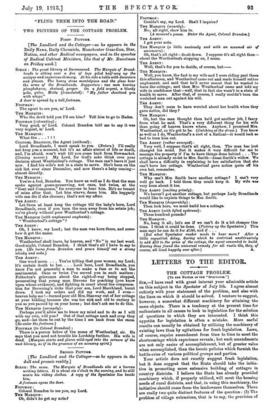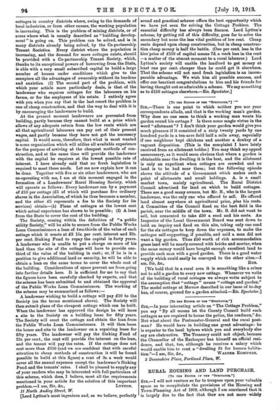LETTERS TO THE EDITOR.
SIB,—I have read with great interest your admirable article on this subject in the Spectator of July 5th. I agree almost entirely with your statement of the problem, and also with the lines on which it should be solved. I venture to suggest, however, a somewhat different machinery for attaining the same objects. There is a tendency at the present time for enthusiasts in all causes to look to legislation for the solution of questions in which they are interested. I think this appetite for legislation is often a mistake. More useful results can usually be obtained by utilizing the machinery of existing laws than by agitations for fresh legislation. Laws, of course, require amendment from time to time to meet the shortcomings which experience reveals ; but such amendments are not only easier of accomplishment, but of greater value when accomplished, than the heroic policies which furnish the battle cries of various political groups and parties.
Your article does not exactly suggest fresh legislation, but it does suggest that the State should take the initia- tive in promoting more extensive building of cottages in country districts. I believe the State has already provided machinery which, if properly utilized, will meet the housing needs of rural districts, and that, in using this machinery, the initiative should come from the landowners themselves. There are really two quite distinct features of the question : (1) The problem of village extensions, that is to say, the provision of
cottages in country districts where, owing to the demands of local industries, or from other causes, the working population is increasing. This is the problem of mining districts, or of areas where what is usually described as " building develop- ment" is going on. This problem can be solved, and is in many districts already being solved, by the Co-partnership Tenant Societies. Every district where the population is increasing, and the demand for more cottages exists, should be provided with a Co-partnership Tenant Society, which, thanks to its exceptional powers of borrowing from the State, is able with a very small subscribed capital to build a large number of houses under conditions which give to the occupiers all the advantages of ownership without its burdens and anxieties. (2) The second part of the problem, with which your article more particularly deals, is that of the landowner who requires cottages for the labourers on his farms, or for the employees of his estate. I entirely agree with you when you say that in the last resort the problem is one of cheap construction, and that the way to deal with it is by encouraging the landowners to build.
At the present moment landowners are prevented from building, partly because they cannot build at a price which allows of any adequate return from the low rents which are all that agricultural labourers can pay out of their present wages, and partly because they have not got the necessary capital. It would seem, therefore, that what is most wanted is some organization which will utilize all available experience for the purpose of arriving at the cheapest methods of con- struction, and at the same time will provide the landowner with the capital he requires at the lowest possible rate of interest. I have already said that no fresh legislation is required to meet these needs. Let me now explain how it can be done. Together with five or six other landowners, who are co-operating with me, I am at this moment engaged in the formation of a Landowners' Rural Housing Society, which will operate as follows : Every landowner can by a payment of £10 per cottage (25 of which will purchase five ordinary shares in the Association, of which he thus becomes a member, and the other £5 represents a fee to the Society for its services) obtain—(1) Plans of cottages at the lowest cost which actual experience has shown to be possible ; (2) A loan from the State to cover the cost of the building.
The Society, coming within the definition of "a public utility Society," will be able to secure from the Public Works Loan Commissioners a loan of two-thirds of the value of each cottage which it erects at £3 15s. per cent. interest and 22s. per cent. Sinking Fund to repay the capital in forty years. A landowner who is unable to put a charge on more of his land than the site of the cottage will have to provide one- third of the value of the building in cash; or, if he is in a position to give additional land as security, he will be able to obtain a loan on the same terms to cover the whole cost of the building. Considerations of space prevent me from going into further details here. It is sufficient for me to say that the figures have been carefully checked by experts, and that the scheme has been submitted to and obtained the approval of the Public Works Loan Commissioners. The working of the scheme may be summarized as follows :— A landowner wishing to build a cottage will pay £10 to the Society (on the terms mentioned above). The Society will then submit plans of the cheapest cottage which can be built. When the landowner has approved the design he will lease a site to the Society on a building lease for fifty years. The Society will erect the cottage and obtain the loan from the Public Works Loan Commissioners. It will then lease the house and site to the landowner on a repairing lease for fifty years. The landowner will pay the Sinking Fund of 22s. per cent., the rent will provide the interest on the loan, and the tenant will pay the rates. If the cottage does not cost more than £150 (and we are confident that with careful attention to cheap methods of construction it will be found possible to build at this figure) a rent of 3s. a week would cover all the annual expenses except the landowner's Sinking Fund and the tenants' rates. I shall be pleased to supply any of your readers who may be interested with full particulars of this scheme, which does, I believe, meet all the requirements mentioned in your article for the solution of this important [Lord Lytton's most ingenious and, as we believe, perfectly
sound and practical scheme offers the best opportunity which we have yet seen for solving the Cottage Problem. The essential difficulty has always been finance. Lord Lytton's scheme, by getting rid of this difficulty, goes far to solve the secondary but none the less vital problem of low rent. Cheap rents depend upon cheap construction, but in cheap construe. tion cheap money is half the battle. (One per cent. less in the hire-price of £150 of capital means 7d. a week less in the rent —a matter of the utmost moment to a rural labourer.) Lord Lytton's society will enable the landlord to get money at least one per cent. cheaper than he could get it elsewhere. That the scheme will not need fresh legislation is an incom- parable advantage. We wish him all possible success, and offer our heartiest congratulations to him and his friends for having thought out so admirable a scheme. We say something as to £150 cottages elsewhere.—ED. Spectator.]











































 Previous page
Previous page